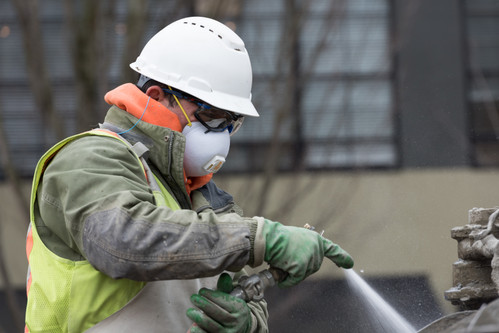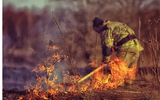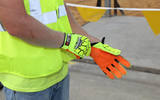Respiratory Basics: P100 vs N95
For a lot of job sites, safety masks and respirators are an essential piece of PPE. The lungs are delicate, important organs that are hard to repair if they get damaged, and inhaling the wrong chemical can have devastating effects on other areas of the body as well. Protect yourself from invisible airborne particles by investing in a respirator or mask suited to your job.
How Masks and Respirators Are Rated
The National Institute for Occupational Safety and Health (NIOSH) is a division of the CDC. They determine the ratings that allow people to choose the right mask for the job. Because government agencies determine ratings for masks, purchasing more expensive brand name N95 masks won’t necessarily provide “better” protection.
The ratings are based on a performance standard. Both the filter material and the relative quality of the mask fit are factored into whether a mask earns a particular rating. The challenge in determining this is smoke with 0.3 micron sized particles. How well does the filter media catch these little buggers, and does the mask fit seal off the path for unfiltered air?
Modern filter media uses a built-in static charge to attract and retain particles as they are pulled through. Some grades of filter can have this static charge ruined when in contact with oil mist. The letter in a mask’s name tells you whether or not the mask can resist oil: N masks are not oil resistant, P masks are oil proof, and R masks are oil resistant.
The number in a rating tells you the minimum amount of airborne challenge particles the mask protects against: an N95 mask keeps out at least 95% of particles but isn’t oil resistant, and a P100 mask is oil proof while protecting the wearer from at least 99.8% of particles.
Where to Use Your N95 Masks
N95 masks see a lot of use in industrial and construction applications where dust and liquids are a frequent hazard. They’re not suited for areas with lead or asbestos particles, gases, oil-based particulates, aerosols, or some particular healthcare applications: specialized filters, masks, and respirators are needed for those kinds of work. Face masks are meant to be single-use and disposed of after removal, and they’re not meant to be shared.
Can N95 Masks Protect Me from a Virus?
The emergence of COVID-19 (and SARS before that) has a lot of people concerned and stocking up on N95 masks. Viruses and bacteria are generally too small for a mask to protect against, though they are almost always in a droplet from a sneeze or cough. The mask will stop the droplets.
Please also remember that your eyes are another pathway, so glasses or goggles may be prudent. Another good thing about wearing a mask is that it prevents you from touching your nose and mouth! This is a prime route for the spread of viruses.
If you are the infected person, please avoid the masks that have an exhalation valve. They do breathe easier than those without, but they allow unfiltered air to escape the mask, and this may not be what you have in mind.
It’s also recommended that you wear a face mask if you have symptoms and are entering a healthcare facility for treatment, and healthcare professionals would likely benefit from wearing one as well. If you do wear a mask, choose one that can be fitted to your face, and use the same health and hygiene practices you would use to prevent the flu (stay home if you’re sick, wash your hands frequently and thoroughly, avoid close contact with others, and keep the disinfectant handy).
Choosing the right PPE for your workers and job can seem like a daunting prospect, but it’s a necessary one to make sure that everyone stays healthy on the job. PK Safety carries a variety of respirators, face masks, and filters for every worksite need from a variety of trusted brands. Our safety experts can answer your questions about air quality, equipment, and worksite safety online or by phone at 800.829.9580.
Please keep in mind that PK Safety staff are not trained medical professionals and therefore cannot give medical advice. You can find additional information about the Coronavirus from the Centers for Disease Control and Prevention (CDC) by clicking here.
Related Articles
A respirator mask works only as good as it fits. It won’t protect you from hazards if it doesn’t fit your face properly.
LEARN HOW TO SIZE A RESPIRATOR
Related Searches
N100 Mask, P100 Filter, 3M 2097, Respirator Kit
Recent Posts
-
Customizing Gas Detectors: Tailoring Solutions to Fit Your Unique Requirements
In today’s diverse industrial landscape, a one-size-fits-all approach to safety simply doesn’t cu …Jul 3rd 2024 -
10 Ways to Prevent Wildfires
You can prevent wildfires by extinguishing flames before you leave the worksite. Avoid practicing …Jul 1st 2024 -
ANSI/ISEA 138 Safety Gloves: Ensuring Hand Protection
The human hand is an anatomical masterpiece and arguably the greatest tool attached to our bodies …Jun 25th 2024





